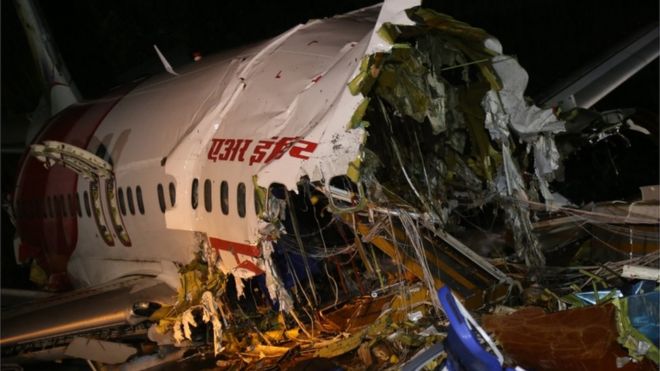On August 7th 2020 a tragic plane crash took place in India of the Air India Express Flight 1344, which caused the sad loss of 18 passengers, and both pilots. Around 100 passengers were injured. So today we will look at what were some possible reasons that it might have happened and also some more information about the flight

About the flight-
This was the Air India Express Flight 1344, the plane was a Boeing 737-8HG(SFP). The plane took off from Dubai International Airport carrying 184 passengers and 6 crew members.
What happened -
The aircraft reached the airport on schedule. The approach was for runway 28, but two landings were aborted due to tailwind and the aircraft circled, waiting for clearance, before making a landing on runway 10. At around 19:37 IST (14:07 UTC), they were given clearance to land on runway 10. Due to the monsoon and floods in Kerala at the time, inclement weather conditions reduced visibility at the time of landing to 2,000 m (6,600 ft). Runway 28 was in use and in the first landing attempt, the pilot could not sight the runway and requested for runway 10. On the second attempt on 2,860 m (9,380 ft) runway 10, the aircraft touched down near taxiway ''C'', which is approximately 1,000 m (3,300 ft) beyond the runway threshold.
The aircraft failed to stop before the end of the tabletop runway and plunged 9–10.5 m (30–35 ft) into a gorge, splitting the fuselage into two sections upon impact. The accident site was around 3 km (9,800 ft) from the airport terminal. No post-crash fire was reported. It was suggested the crew shut off the engines on landing, which may have saved lives by preventing a fire. According to a CISF officer, the aircraft did not slide into the gorge. It took off from the cliff and then collapsed. The accident was similar to Air India Express Flight 812 which also overran the runway 10 years earlier at Mangalore International Airport killing 158 people on board.
Possible reasons -
1. Weather
Due to bad weather conditions during landing, the runway was wet and slippery due to which the plane might have skidded off the runway.
![FULL HD] CAUTION!! WET RUNWAY!! Air Europa blowing up water at ...](https://i.ytimg.com/vi/bfq6ycpcSB4/maxresdefault.jpg)
Since there were 2 go-arounds due to high tailwind there is also a possible reason that the plane skidded off due to it being lighter after the go-arounds which meant that it could not apply as much pressure on the runway to stop.
2. Mechanical failure
There is a possibility that due to the wet runway the wheels might have locked during landing and skidded although planes have an anti-skid system which is almost like the ABS in our cars there might have been an issue with the hydraulic system controlling it or it might have been manually turned off by the pilots.

3 Airport conditions
There is also a possibility that this crash was not due to any pilot error or mechanical failure but because of the bad conditions of the runway.
Calicut International Airport, located in Karipur, Kozhikode, is one of the riskiest and most unsafe airports in India as per Directorate General of Civil Aviation's (DGCA) 2011 data. The DGCA classified Calicut as a "critical airfield" which means that only the captain (and not the first officer) can perform takeoffs and landings at the runway.

Captain Mohan Ranganathan, a member of a safety advisory committee of the Ministry of Civil Aviation, in 2011, had called it 'unsafe' and had recommended that it not be used for landing during wet conditions. He had noted that it had a tabletop runway with a down-slope and inadequate buffer zone or runway end safety areas (RESA) at each end of the runway. Instead of a 240 m (790 ft) buffer zone, it had only 90 m (300 ft). Engineered material arrestor system (also known as arrestor bed or EMAS) is also absent in the airport, which could have averted the accident. Several warnings were ignored by the authorities. Due to inadequate RESA and other safety issues, many international airlines had stopped landing wide-body aircraft at Calicut.
The investigation is not over yet, so we do not have a definite cause for the incident, I have only stated POSSIBLE reasons for it in this blog, none of them are yet completely confirmed/
Check out my YouTube channel by clicking here.
For suggestion or your comments, you can comment down below or follow and reach out to me on Twitter by clicking here -
Follow @Feplayofficial
This comment has been removed by a blog administrator.
ReplyDelete